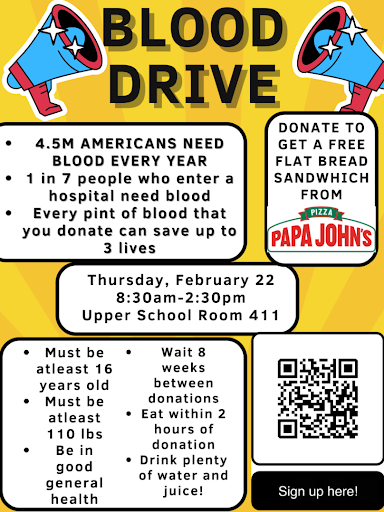Upper School English teacher Ann McGlinn had just started graduate school at the University of Montana. She was so excited—she was studying poetry, teaching undergraduates for the first time, and had a huge new group of friends.
Suddenly, Ms. McGlinn’s ulcerative colitis—an inflammatory bowel disease that can cause blood loss in severe cases—took a turn for the worse. After becoming extremely weak from blood loss, she was taken by her friends to a hospital, where she had to be stabilized by blood transfusion so that she could be flown to the Mayo Clinic for further care.
“I was so healthy [and had] never ever thought that I would ever need anything like [blood transfusions],” Ms. McGlinn said. She ultimately had to have her colon removed and needed another blood transfusion in preparation for the operation.
“Because of the generosity of strangers, I was able to get this life-altering surgery,” she said. “Within six months I was back at school and back with my friends. It completely changed my life.”
On February 22 Latin hosted their biannual blood drive to help people in need of blood—as Ms. McGlinn was. Latin worked with Vitalant, a non-profit blood services provider, and all eligible members of the Latin community were encouraged to donate blood.
“I was very moved by Ms. McGlinn’s experience,” Upper School librarian Gretchen Metzler said. “It was the first time in a long time that I managed to successfully give blood.”
The blood donation process took around 50 minutes per person. Students looking to donate were expected to do so during their free periods. All donors were advised to have a meal and water within two hours of donating and were provided with a coupon to get a free flatbread sandwich from Papa John’s.
“I donated blood because it’s one of the easiest ways to save someone’s life,” junior Kayley McCutcheon said.
”Blood can’t just be created; people have to donate and volunteer,” Kayley added. “I encourage my peers to donate because innocent people all over need blood. It’s the right thing to do.”
In the United States, someone requires blood every two seconds. Blood donations are often life-saving, as blood is crucial to surgeries, chronic medical conditions, cancer treatment, and more. Blood also cannot effectively be substituted or manufactured, which makes blood drives very important—particularly in the face of an ongoing emergency blood shortage with the lowest number of blood donors in 20 years.
“I’ve run blood drives for 15 years at Latin,” Director of Student Life Tim Cronister said. “I used to give blood and [had a period where] I couldn’t give blood, so I thought that it’d be nice to run the blood drives while I couldn’t give.”
A total of 39 people donated to Latin’s February 22 blood drive. Based on the statistic that a single blood donation can save up to three lives, Latin’s 2024 drive supported up to 117 people in need.
“I’m so impressed by the generosity of so many people here—the students and staff and faculty,” Ms. McGlinn said. “So many students showed up and donated blood, and it just makes me so ecstatic, because your donation of blood can literally save people’s lives.”
She added, “For one hour of your time and giving your blood, you’re either—in my case—positively altering someone’s life or you’re saving a life. What can be better than that?”



















































Ann McGlinn • Apr 13, 2024 at 9:13 am
Thanks, Sofia, for such a thoughtful and well-written article on this year’s blood drive!